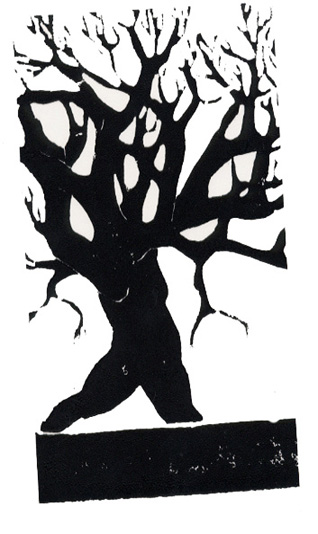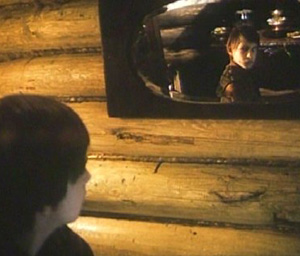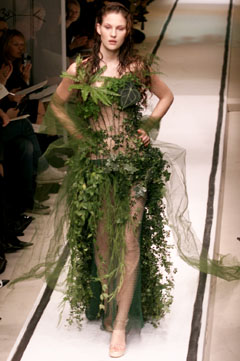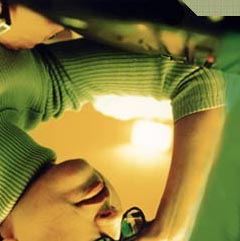Q&A: INTERVIEW WITH AVENARIUS
 DANCING TREE
DANCING TREEDr. Prof. Ing. I. M. Avenarius is a virtually unknown, unlicensed landscape aesthetician barely living in New York City. He met with the editors of the ARCHIVE-GROTTO at an undisclosed location in Manhattan in early February 2003 for a brief discussion of Landscape + Architecture: The Fusion Thing, a top-secret project often referred to by people in the know as "The Manhattan Project".
Q: Dr. Prof. Ing. Avenarius, how would you characterize your work? A: Post-schizo-neurotic, neo-late-surrationalist. Q: Not post-neo-late, neurotic romanticist? A: Been there, done that. Q: What would you like to be in your next lifetime? A: A dancing tree. Q: Have you ever regretted anything in your current lifetime? A: Yes, the words 'landscape architecture'. Q: Do you see a therapist? A: No. Where? Q: Is it true that your name is actually a confabulation of several different literary affectations? A: I am all literary affectations. Q: What's your favorite poem, then? A: After Shakespeare's 'song' in Cymbeline, "Golden lads and girls all must / As chimney-sweepers, come to dust", it's the "Song of Wandering Aengus" by Yeats. Q: Can you recite it for us? A: Sure, why not?
The Song of Wandering Aengus
I went out to the hazel wood,
Because a fire was in my head,
And cut and peeled a hazel wand,
And hooked a berry to a thread;
 And when white moths were on the wing,
And when white moths were on the wing,And moth-like stars were flickering out,
I dropped the berry in a stream
And caught a little silver trout.
When I had laid it on the floor
I went to blow the fire aflame,
But something rustled on the floor,
And some one called me by my name:
It had become a glimmering girl
With apple blossom in her hair
Who called me by my name and ran
 And faded through the brightening air.
And faded through the brightening air.Though I am old with wandering
Through hollow lands and hilly lands,
I will find out where she has gone,
And kiss her lips and take her hands;
And walk among long dappled grass,
And pluck till time and times are done
The silver apples of the moon,
The golden apples of the sun.
--William Butler Yeats
Q: "Did you ever hear about, did you ever hear about Wordsworth and Coleridge?" A: Yes. "They were smokin' up in Kendal. By the lakeside." Q: Is it true that you recently gave a lecture at OSU / SOA without identifying any of the slides you showed? A: Yes, but I was appearing under an assumed name. Q: What was the topic of your presentation? A: I'm not sure. Q: Does anyone know? A: Most likely not.
 SUSPECT TERRAIN
SUSPECT TERRAINQ: Questioning your past seems to lead into the interminable moraine of unsubstantiated speculation. Is it correct that you once lived in Maine? A: Correct. I lived on the coast of Maine in the go-go 1980s.
Q: Were you by any chance reading any of the following at this time: 1/ Jean-Jacques Rousseau; 2/ Henry David Thoreau; or 3/ Martin Heidegger? A: No. I was reading Emerson though. And Thomas Merton. I only started to read Heidegger after acquiring a taste for crypto-poetic neologisms while at Cornell. Q: What was the origin of this acquired taste? A: I found it necessary to invent a pseudo-sublime language to explain the thing otherwise known as landscape architecture.
Q: Is it true that at the OSU lecture you characterized architecture as "hegemonic"? A: I intended to avoid that word entirely but they were asking for it. I apologized, however, for mentioning Deleuze and I never mentioned Heidegger by name although I did use the term 'always-already' several times.
NEW YORK, NEW YORK, NEW YORK
Q: What's the future of New York City? Isn't it almost-already irrelevant now as a locus of avant-garde culture? A: The only possible future for NYC is as a City-State. Otherwise, it is all but over. The City needs to shrug off the rest of the State and become autonomous. Unfortunately, if this happened it would also dump the three main outer boroughs. New York is synonymous anyway with Manhattan.
 Q: You have called Manhattan, in the past, "New York, New York, New York"! Don't you think that is gilding the lily? And you say "dump the three main outer boroughs". What about the fourth? A: Manhattan is where all the money, power, and prestige is. That is why a City-State -- like Venice of old, or Hong Kong today -- makes sense. The problem is the boroughs. They get shafted all the time anyway and they would be unceremoniously dumped, except for Staten Island, which wants out anyway. NYC is doomed to irrelevance until it comes to terms with the evasion of almost everything by the elite. I say tax them and see if they really run away like they're always threatening to do. The big corporate entities always threaten to move to New Jersey if the mayor suggests taxing them. Instead, they get endless subsidies. This includes the no-good NGOs -- cultural and otherwise. As a City-State, NYC could also institute tourism quotas, limiting the number of visitors to the city like Venice. Some days the city is unbearable. SoHo is now a large shopping mall and Midtown around Fifth and 57th is simply impassable. The city belongs to those who live and work there, not guests or corporate commuters from Connecticut, New Jersey, and Upstate. Unfortunately, the current regime believes the opposite. Q: Would you run for mayor? A: No. Instead, I'd nominate Massimo Cacciari for mayor. Q: Is he available? A: I doubt it.
Q: You have called Manhattan, in the past, "New York, New York, New York"! Don't you think that is gilding the lily? And you say "dump the three main outer boroughs". What about the fourth? A: Manhattan is where all the money, power, and prestige is. That is why a City-State -- like Venice of old, or Hong Kong today -- makes sense. The problem is the boroughs. They get shafted all the time anyway and they would be unceremoniously dumped, except for Staten Island, which wants out anyway. NYC is doomed to irrelevance until it comes to terms with the evasion of almost everything by the elite. I say tax them and see if they really run away like they're always threatening to do. The big corporate entities always threaten to move to New Jersey if the mayor suggests taxing them. Instead, they get endless subsidies. This includes the no-good NGOs -- cultural and otherwise. As a City-State, NYC could also institute tourism quotas, limiting the number of visitors to the city like Venice. Some days the city is unbearable. SoHo is now a large shopping mall and Midtown around Fifth and 57th is simply impassable. The city belongs to those who live and work there, not guests or corporate commuters from Connecticut, New Jersey, and Upstate. Unfortunately, the current regime believes the opposite. Q: Would you run for mayor? A: No. Instead, I'd nominate Massimo Cacciari for mayor. Q: Is he available? A: I doubt it.THE GOAT TRACK
Q: You have lately formulated something called "Toward 'S': The Goat Track". What is this? A: It's "Toward 'S': The Goat Track". Q: Yes, okay. But what does it mean? A: I have no idea. Q: Then why are you pursuing it? A: It seems so -- um -- desirable. Q: In what sense? A: In every sense. In the best sense. Q: But what is 'S'? A: 'S' = Some-thing Else. Q: Is that hyphen really necessary? A: Yes and No. Q: What else might 'S' indicate? A: Perhaps 'slippery'. Q: Perhaps? I see you have no intention of being serious. Isn't this exactly the problem? A: Not at all. The pursuit of the Sublime Some-thing Else requires negotiating the Slippery Slope of rhetoric and What Have You. Q: What's this "What Have You"? A: Nothing much at all. Q: Is this "nothing much at all" not some-thing after all? A: Sure. Q: And is it not actually the so-called sublime subject of 'S'? A: Exactly. Q: So, why The Goat Track? A: 2003 is The Year of the Goat.
Q: I've heard you're working on something called "Black and Blue". A: Yes, it's an essay on L + A: The New Black, or L + A: The True Blue. Q: Does it contain 'S' words? A: Yes, certainly. Q: And this is related to Red, Green, Blue? A: You mean the syllabus for an unteachable seminar at an unnamed architecture school? Q: Yes. What's the relationship? A: It's a kind of new theory of color. Red = formalism. Green = ecology. Blue = philosophy and cultural poetics. The amalgam RGB = Synthesis. Q: What's cultural poetics? A: The art of poetical culture. Q: Do you always wear black? A: No. Sometimes I wear black and blue. Q: Is that some sort of statement? A: You mean fashion statement? Q: I mean, is it a cultural-poetic statement vis-a-vis L + A? A: Almost definitely.
Q: On a lighter note, why the prescription blue sunglasses? A: I was on the subway in Prague two years ago and there was this lassie with prescription blue sunglasses. I made a mental note to find some when I returned to NYC. She was stunning. I've always had a subsidiary interest in the architecture-fashion fusion thing insofar as it adds a little spice to an otherwise dreary world. Q: You mean the design world? A: I mean the otherwise, everyday dreary world, which includes the so-called design world. Beauty is generally a taboo subject, today, except as a fashion accessory. Q: Where'd you find them? A: At Robert Marc opticians. The frames are Freudenhaus. Q: Is that a plug? A: Yes, my interest in the architecture-fashion fusion thing is 2% on the dollar. Q: So, you get your fashion cues from pretty young things on the subway? A: Sometimes. When I'm really, really bored I'll pick up a copy of Italian Vogue. Q: You read / speak Italian? A: I read the pictures. I also get all my news by reading the tabloids over the shoulder of people on the subway. There's really no need to buy newspapers. Q: Do you have a most embarrassing moment? A: Yes. Recently I discovered that I had a shoulder-length ear hair and no one bothered to tell me. Q: What if it had been a nose hair? A: I would have caught that.
Q: Why'd you decide to study landscape architecture? A: I was in Scotland in 1985 (at the Royal Botanic Garden Edinburgh) and taking care of two exhibition glasshouses full of tropical plants. When October rolled around, and the sun rose at 9 in the morning, I had an epiphany of sorts: i.e., "Better to get out of here". I returned to the US and looked at L.A. programs. I also met some L.A. students from the University of Edinburgh while at the RBGE. I was spooked by the amenity horticulture thing in the UK, with its green wellies and felt coat with plastic shoulders. If you tried to cross the street wearing that stuff, cars would intentionally try to run you down. So I applied to two schools -- Harvard GSD and Cornell -- and went to the Portland School of Art [now known as the Maine College of Art, or MeCA] to study architectural design in the meantime. I went to Harvard for an open house and MVV was master of ceremonies. He made some disparaging remarks about "landscape architects who want to save the world" and I felt nauseous. Fortunately, I was turned down by the GSD and went to Cornell. Harvard was then admitting people with credentials in nouvelle cuisine to offset those it admitted who wanted to "save the world". Q: Do you want to save the world? A: Sure, why not. But I'm afraid it's already lost, or always-already lost.
 AIR RIGHTS
AIR RIGHTSQ: I've heard that you live on air. A: Is that a question? Q: Yes. How do you do that? A: I breath in and I breath out about 3,600 times an hour. Air is still free. Q: You don't want to talk about it? A: What for? I recently saw the Liv Ullmann-directed-Bergman-written film Faithless [Infidèle, 2000] and one of the protagonists had $400,000.00 in debt. It made me feel better. Q: But life is not a film. A: Sometimes it is. Q: If it were, what film would you live in? A: Probably Tarkovsky's Mirror [1974]. I get goosebumps when I see that film, and I've seen it several times. In fact, I own it and watch it whenever I want to leave the planet. Q: Isn't that a semi-tragic film? And why in the world would you want to inhabit a semi-tragic film? A: All the best films are tragedies. It's the human condition. The aforementioned Liv Ullmann-Bergman film was not a tragedy so much as a farce. The gods couldn't possibly have cared about those three self-absorbed artistes and their self-inflicted journey to Hell. Q: That's a bit much. Are you saying tragedy requires that the gods care about what's going on? A: Of course. Q: I sense here that you are about to drop references to all the books on tragedy from Nietzsche to Eagleton. If so, don't bother. A: You skipped Benjamin. Q: It was implied. A: Eagleton is almost god-like. Q: Thus he cares about the idea of the tragic? A: I'd say so.
THE SHADOWY, THE RECONDITE, ETCETERA
Q: Dr Prof, in your unpublishable essay "Moravian Shadows" you rhapsodize the shadowy, the recondite, and the obscure. Why? A: I like the shadowy, the recondite, and the obscure. Q: But isn't that just a bit facetious? A: No. The shadowy is where all the best things occur. In Goethe's color theory, the shadowy is the source of color. To Hell with Newton. Q: And Descartes? A: He's already there.
 Q: And Newton is not? A: No. The apple is always-already falling on his head. Q: I suspect your frequent references to Pascal are a way of taking a swipe at Descartes. Is that so? A: Sure. Descartes was the beginning of the end. Q: But doesn't one of your heroes -- Slavoj Zizek -- constantly refer back to the Cartesian subject? A: Yeah, he does. But he's also constantly trying to resuscitate Lenin. It's all a game. Afterall, Zizek reviews non-existent books and he once wrote a critique of Rosselini's films without ever having seen any of them. Q: Is Zizek almost god-like? A: Almost. Q: Is God a neo-Marxist? A: It would seem that the god-like are almost always neo-Marxists or Socialists. But I think Dostoievsky had it right when he said the Russian revolution failed because it was not spiritual. Neo-Marxists can be god-like, but eventually the ideology has to be transformed into the critical-poetical, sublime je ne sais quoi. Q: What's that? A: I don't know. But Bachelard had it, Perez-Gomez has it, Barthes had it, Tafuri had it, Cacciari has it, Agamben has it. Q: Is it a disease? A: Quite probably. But it will cure almost anything that ails you. Q: Can it cure misanthropy or melancholy? A: Those are the last temptations. They require grace to overcome. Q: You believe in grace? A: Yes. Especially if she's wearing Jean-Paul Gaultier.
Q: And Newton is not? A: No. The apple is always-already falling on his head. Q: I suspect your frequent references to Pascal are a way of taking a swipe at Descartes. Is that so? A: Sure. Descartes was the beginning of the end. Q: But doesn't one of your heroes -- Slavoj Zizek -- constantly refer back to the Cartesian subject? A: Yeah, he does. But he's also constantly trying to resuscitate Lenin. It's all a game. Afterall, Zizek reviews non-existent books and he once wrote a critique of Rosselini's films without ever having seen any of them. Q: Is Zizek almost god-like? A: Almost. Q: Is God a neo-Marxist? A: It would seem that the god-like are almost always neo-Marxists or Socialists. But I think Dostoievsky had it right when he said the Russian revolution failed because it was not spiritual. Neo-Marxists can be god-like, but eventually the ideology has to be transformed into the critical-poetical, sublime je ne sais quoi. Q: What's that? A: I don't know. But Bachelard had it, Perez-Gomez has it, Barthes had it, Tafuri had it, Cacciari has it, Agamben has it. Q: Is it a disease? A: Quite probably. But it will cure almost anything that ails you. Q: Can it cure misanthropy or melancholy? A: Those are the last temptations. They require grace to overcome. Q: You believe in grace? A: Yes. Especially if she's wearing Jean-Paul Gaultier.Q: Lastly, speaking of literary affectations, I understand the name Avenarius comes from Milan Kundera's book Immortality. Is that the case? A: I can neither confirm nor deny this rumor. I suggest that you read the book.
 The Editors (02/06/03)
The Editors (02/06/03)"Nature is not a mirror; we are a mirror. Long ago we doubled our 'nature' ... It's the old story of Narcissus and Echo ... And we are therefore always at risk of drowning in representations ..."
"Mediations are mediations. Sic transit tautologies. The game is to 'cross' them out, eliminating one after another, until you are left staring at your Self in the mirror ('Nature' itself)."
"The Real is the Irreal (and vice versa). Since the Real is slaughtered every day, we have little choice (short of becoming Luddites, Mennonites, or Cistercians) but to embrace the near-zero degree of the Irreal."
Dr. Prof. Ing. I. M. Avenarius, Bons Mots (London: Sub-Verso Press, 2005)
POSTSCRIPT
Dr. Prof. Ing. Avenarius is currently vacationing on an unidentified radioactive atoll in the South Pacific. He refused to comment on the latest batch of World Trade Center proposals except to say: "They are near perfect examples of the idea of landscape + architecture about almost nothing". His latest book, The Unbearable Burden of Theyness, is always-already forthcoming from Sub-Verso (London).
Image (above) - The only known image of Dr. Prof. Ing. I. M. Avenarius taken with a bowtie camera by an unknown architect circa 2002